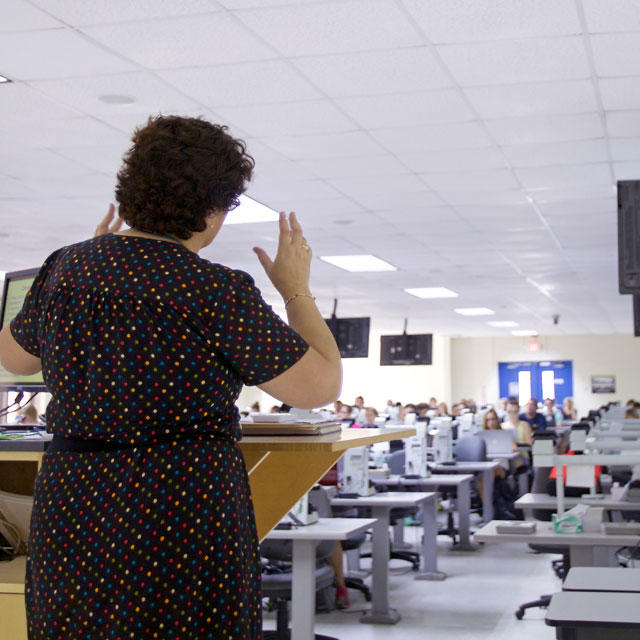When many people think about what do veterinarians do, their only frame of reference is whatever they’ve seen or experienced when they’ve taken their pet to a local animal clinic for care. The reality of the veterinary profession is much broader, with career opportunities for licensed veterinarians available in a wide variety of settings, from private-practice clinics to public-health research organizations to biopharmaceutical firms to community animal shelters. Furthermore, the types of veterinary specialists are nearly as wide-ranging as in human medicine.
The American Veterinary Medicine Association (AVMA) currently recognizes 22 veterinary specialties. These encompass the types of vets and specialty areas most people are familiar with from human medicine—internal medicine, ophthalmology, radiology, surgery, and emergency and critical care, for instance—as well as those unique to the veterinary profession: animal welfare, poultry veterinary medicine, laboratory animal medicine and theriogenology (animal reproduction), for example.
“You do see kind of a continued trend of super-specialization” in veterinary medicine, says Dr. Ryan Cavanaugh, associate professor for small-animal surgery at Ross Vet in St. Kitts. Cavanaugh compares it with the trend of hyper-focused specialization in human medicine. Parents of a child who requires stomach surgery, he says, increasingly will seek out not merely a general surgeon but a board-certified pediatric surgeon who has experience in gastroenterology to perform the procedure.
Cavanaugh himself is a board-certified veterinary surgeon, “but I had a specific interest beyond that,” he notes, “so I did additional training, and now I’m a board-certified surgical oncologist”, specializing in veterinary cancer surgery.
Cavanaugh notes that the question many ask, ‘what does a veterinarian do?’ now has a much broader definition. “I see it as a very exciting advancement in our profession,” Cavanaugh says. “A lot of people don’t realize how sophisticated our medicine is. We’re learning the same techniques and the same medical interventions that a human physician would. … We are doing the same level of medicine that is being done on the human side.”
Dr. Andrea Peda, an assistant professor at Ross Vet, echoes Cavanaugh’s comments and adds that there is a growing need for different types of veterinarians and different types of veterinary practices. “All aspects of veterinary medicine are in demand, whether (you’re looking at) food inspection, biomedical research, shelter medicine” or other veterinary fields, she says. “There so many opportunities” for all types of vets, Peda offers.
TYPES OF VETERINARIANS
So, what types of vets are there and what do vets do? The 22 different organizations recognized by the American Veterinary Medical Association (AVMA), represent 41 distinct veterinary medicine specializations and subspecialties. These specializations require training beyond attaining your initial DVM degree, but they are well worth it if you discover a passion for a particular area. Generally speaking, most specialty organizations require veterinarians to spend one year in an internship practicing in their area of interest and to complete a residency training program for two to three years.
To help uncover a bit more of what do veterinarians do, we have provided introductions to the types of veterinarians there are within the context of specialization you could pursue. The sky's the limit when it comes to a degree in veterinary medicine!
1. Anesthesia and Analgesia
All veterinarians are trained in anesthesia and pain relief. Veterinary anesthesiologists pursue additional studies in this area to become experts on administering and monitoring anesthesia, mitigating the risks of anesthesia, and advanced techniques in providing pain relief.
2. Animal Welfare
Veterinarians who pursue additional training in animal welfare can provide vital insights for overall animal wellbeing. They provide animal welfare expertise by balancing scientific knowledge with ethical and societal values. Diplomates of the American College of Animal Welfare is essential in educating other veterinarians and the public about current animal welfare issues.
3. Behavior
Veterinary behaviorists focus exclusively on animal behavior. These veterinarians may be called upon for behavior issues more extensive than house training or basic obedience. Veterinary behaviorists thoroughly review their patient’s medical history to identify issues and may use a variety of behavior modification techniques and medications as part of a treatment plan.
4. Dentistry
As do humans, animals also need dental care. Veterinary dentists are specialized in the diagnosis and treatment of conditions related to the teeth and the oral cavity. Veterinary dentists may perform advanced surgical extractions of teeth or even root canals.
5. Dermatology
The skin is the largest organ in the animal (and human) body, so naturally, there are veterinary specialists to address the many conditions that affect the skin. Veterinary dermatologists specialize in treating skin conditions in a variety of species. These veterinarians also receive advanced training in immunology and internal medicine so they can accurately address skin conditions that may result from other underlying health issues.
6. Emergency and Critical Care
Animal emergencies are inevitable. Diplomates of the American College of Veterinary Emergency and Critical Care undergo specialized training to handle the most critically ill patients. These veterinarians, often found in emergency hospitals or intensive care units, are experts in the stabilization, treatment, and monitoring of critical patients.
7. Internal Medicine
Internal medicine covers several different specialty areas for veterinarians. Diplomates of the American College of Veterinary Internal Medicine can choose from such specialties as:
- Cardiology
- Neurology
- Small or Large Animal Medicine
8. Laboratory Animal Medicine
Lab animal veterinarians are critical in a research setting. Lab animal veterinarians ensure that such lab animal species as rodents, rabbits, and primates are treated ethically and humanely.
9. Microbiology
Diplomates of the American College of Veterinary Microbiologists are infectious disease experts. These veterinarians often work in a lab setting and play an important role in public health because many animal diseases also affect humans. Choosing this path results in such areas of specialization for veterinarians as:
- Bacteriology/ Mycology
- Immunology
- Parasitology
- Virology
10. Nutrition
Veterinary nutritionists are highly trained in the diet and nutritional needs of animals. These veterinarians consider the individualized nutritional needs of each patient and formulate diets for them. Veterinary nutritionists are often employed by pet food companies to ensure accurate, healthy, and safe diet preparations.
11. Ophthalmology
It may seem to be a small area of specialization for veterinarians, but maintaining healthy eyes is an important aspect of animal health. Veterinary ophthalmologists utilize medical and surgical techniques to handle a wide range of complex and chronic eye conditions.
12. Pathology
Veterinarians commonly sample tissues or fluids for analysis, but it is often an expert in pathology who analyzes and interprets the samples. Veterinary pathologists may also conduct necropsies—post-mortem animal examinations. Veterinary pathologists can be found in industry and government organizations and are often involved in pharmaceutical research.
13. Pharmacology
Just as there are individuals who specialize in understanding human medications, there are veterinarians who specialize in animal medications. Diplomates of the American College of Veterinary Clinical Pharmacology play an important role in drug development and studying medication interactions.
14. Poultry
If you want to work in a food production setting, poultry medicine may just be the veterinary specialization for you. These veterinarians work with such species of fowl as chickens, turkeys, and ducks to ensure the safety of meat and egg products.
15. Preventive Medicine
The prevention of diseases is equally important as the treatment of diseases. Diplomates of the American College of Veterinary Preventive Medicine are trained in surveillance, recognition, outbreak investigation, and management of animal diseases.
16. Radiology
Veterinary radiologists are specialists in such forms of diagnostic imaging as X-ray, ultrasound, computerized tomography (CT) scans, and magnetic resonance imaging (MRI). These experts are invaluable to other veterinarians seeking advanced imaging and interpretation.
17. Sports Medicine and Rehabilitation
Diplomates of the American College of Veterinary Sports Medicine and Rehabilitation focuses on the unique needs of athletic and working animals and provides physical therapy. These types of veterinary specialists aim to sustain health or return animals to normal health and function after surgery or injury. Specialists within animal sports medicine may choose to work with dogs or horses.
18. Surgery
General practice veterinarians perform such routine surgeries as spays, neuters, and dental cleanings, but many complicated surgical procedures require the hands of a specialist. Veterinary surgeons may choose a small or large animal path and they often have specialized equipment and facilities to perform the most complicated procedures.
19. Theriogenology
These types of veterinary specialists handle all aspects of animal reproductive health. Diplomates of the American College of Veterinary Theriogenologists may be involved with artificial insemination, pregnancy checks, and surgical procedures.
20. Toxicology
Animals may encounter poisons in numerous situations outside of the home, so the veterinary medicine specialization in toxicology is vitally important. Veterinary toxicologists study poisons and toxins and can provide superior advice on how to treat animals exposed to these substances.
21. Veterinary Practitioners
Many types of veterinarians are required to address the unique needs of different animal species. By becoming a Diplomate of the American Board of Veterinary Practitioners, you may choose from such areas of specialization for veterinarians:
- Avian Practice
- Beef Cattle Practice
- Canine and Feline Practice
- Dairy Cattle Practice
- Equine Practice
- Exotic Companion Mammal Practice
- Feline Practice
- Food Animal Practice
- Reptile and Amphibian Practice
- Shelter Medicine Practice
- Swine Health Management
22. Zoo Medicine
Have you dreamed of working with tigers, polar bears, or giraffes? Diplomates of the American College of Zoological Medicine are experts in all manner of zoo, wildlife, and aquatic species. These veterinarians also play an important role in conservation efforts around the world.
WHICH VETERINARY SPECIALTY IS RIGHT FOR YOU?
You may be overwhelmed after reading about all the types of veterinarians, but rest assured, you have time to figure out which veterinary specialty is right for you. The first step to becoming a veterinary specialist and learning exactly what do veterinarians do is to graduate from veterinary school and obtain licensure.
During veterinary school, you will be exposed to classes on many subject matters that can help you determine if pursuing a specialty is something you want to do. You may also have opportunities during veterinary school for externships with various specialists, so definitely take the chance to learn about these specialties and discover where your passion lies within the field of veterinary medicine.
Ross Vet is dedicated to helping students achieve their fullest potential and engage in the veterinary career that best suits their goals. Take the next step on your path to becoming a veterinarian. Apply for admission to Ross Vet.
Related Resources:
*Ross University School of Veterinary Medicine confers a Doctor of Veterinary Medicine (DVM) degree, which is accredited by the American Veterinary Medical Association Council on Education (AVMA COE), 1931 N. Meacham Road, Suite 100, Schaumburg, IL 60173, Tel: 800.248.2862. For more information please visit: https://www.avma.org/education/accreditation-veterinary-colleges.
The AVMA COE uses defined standards to evaluate veterinary medical education programs, including facilities, clinical resources, curriculum, faculty, student outcomes and research programs. The standards are interpreted and applied by the AVMA COE-accredited veterinary medical education programs in relation to its mission.





